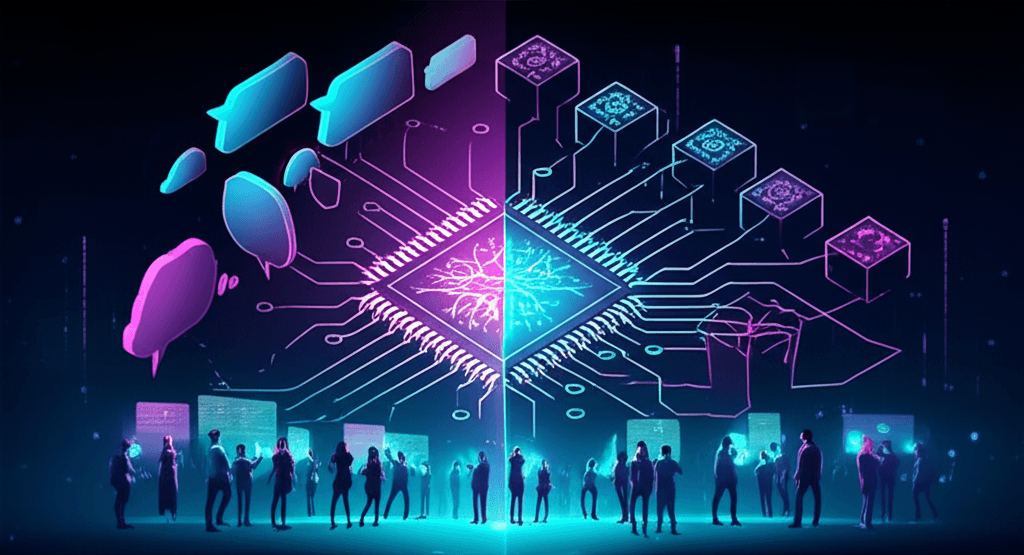AI Unleashes Web3: New Paradigm Empowers Everyone to Build Decentralized Apps
AI-powered "vibe-coding" is democratizing Web3, translating natural language into dApps and smart contracts for all.
August 26, 2025

A new paradigm is rapidly reshaping the landscape of software development, moving beyond traditional line-by-line coding into a more intuitive, conversational process. This approach, known as "vibe-coding," leverages artificial intelligence to translate natural language prompts into functional code, and its impact is particularly profound in the complex and specialized world of Web3. The development of decentralized applications (dApps), smart contracts, and other blockchain-based infrastructure has historically presented a steep learning curve, demanding deep expertise in niche programming languages like Solidity and Rust. Now, a new breed of AI-powered platforms is emerging to abstract away much of this complexity, democratizing access and accelerating innovation in the decentralized ecosystem. These tools are not merely code assistants; they are becoming collaborators, auditors, and even autonomous agents capable of building, deploying, and securing the foundational elements of the next-generation internet.
At the forefront of this movement are platforms designed to empower both seasoned developers and those with no coding experience. Dreamspace, for example, leverages powerful AI models from Microsoft Azure to enable users to generate fully functional dApps and smart contracts simply by describing their idea in plain language.[1][2][3] By integrating with scalable infrastructure like the Base blockchain, Dreamspace allows creators to build and monetize their applications directly on-chain, embedding features like cryptocurrency payments or token-gated access without writing a single line of code.[2][3][4] This approach dramatically lowers the barrier to entry, potentially unleashing a wave of creativity from a new class of non-technical builders who can now bring their decentralized ideas to life.[1][5] The platform's integration with verifiable databases further ensures that applications are built on reliable and trusted data, a critical component for any blockchain-based system.[1]
For developers seeking more hands-on control while still benefiting from AI augmentation, comprehensive tool suites are becoming indispensable. Platforms like Workik AI offer a versatile solution, supporting a wide range of blockchain frameworks including Ethereum, Solana, and Polkadot, and generating code in both Solidity and Rust.[6] Workik's AI-driven features extend beyond simple code generation; they assist with gas optimization to reduce transaction costs, conduct security audits to identify potential vulnerabilities like reentrancy attacks, and help debug and refactor existing smart contracts.[6][7] Similarly, ChainGPT provides a sophisticated, end-to-end AI infrastructure for the Web3 space.[8] Its AI models are specifically trained on vast datasets of blockchain code, security protocols, and industry best practices, allowing its smart contract generator to produce a wide array of contract types, from simple tokens to complex decentralized finance (DeFi) mechanisms.[9][10] ChainGPT also offers an AI-powered auditor that can quickly scan for threats, offering a proactive layer of security that complements the development process.[9] These integrated platforms streamline the entire development lifecycle, from ideation and prototyping to deployment and ongoing maintenance.
Beyond full-scale development environments, specialized AI tools are enhancing specific, critical aspects of the Web3 workflow. Alchemy, a major Web3 developer platform, introduced ChatWeb3, an AI assistant trained on thousands of pages of vetted Web3 documentation.[11][12] This tool acts as an expert pair programmer, helping developers understand complex concepts, generate code snippets, and debug challenging errors by providing contextually relevant answers within their existing workflow.[11][13] Security, a paramount concern in Web3 where smart contract flaws can lead to catastrophic financial losses, is also being revolutionized by AI. Tools like SolidityScan and AuditBase leverage AI algorithms trained on thousands of real-world audit reports and known vulnerabilities to automatically scan smart contracts for weaknesses.[14][15][16] These platforms can detect issues with exceptional accuracy and speed, providing developers with detailed reports and remediation suggestions, thereby making the auditing process faster, more affordable, and more accessible.[14][15] This proactive approach to security is essential for building trust and ensuring the safe deployment of decentralized applications.[14]
The rise of AI-powered vibe-coding in Web3 carries significant implications for the future of both the AI and blockchain industries. It is fostering a new development paradigm where the ability to clearly articulate an idea and guide an AI becomes as valuable as traditional coding expertise.[17] This shift promises to significantly expand the pool of Web3 creators, accelerating innovation and the adoption of decentralized technologies.[18][17] For the AI industry, the unique demands of Web3 are driving the creation of highly specialized models trained on domain-specific data, moving beyond generic large language models which have shown to be unreliable for secure and efficient smart contract generation, particularly for non-EVM ecosystems like Solana.[19] However, challenges remain. The risk of AI generating flawed or insecure code is significant, necessitating robust human oversight and rigorous testing.[19] Despite these hurdles, the synergy between AI and Web3 is undeniable. As these AI platforms continue to mature, they will not replace developers but rather augment their capabilities, handling repetitive tasks and allowing humans to focus on higher-level architecture, creative problem-solving, and the strategic vision that will ultimately build the decentralized future.[20][21]
Sources
[3]
[4]
[6]
[7]
[8]
[10]
[11]
[12]
[13]
[14]
[15]
[16]
[18]
[19]
[20]